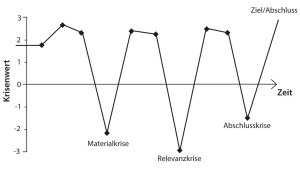
Despite all the positive aspects of doing a doctorate, the doctoral phase rarely goes by unhampered by Crises. It even carries an increased risk of psychological distress and illnesses. This has been the subject of increasing discussion and research in recent years. You will find an overview below.
Typical Crises during the doctoral process
Typical PhD Crises according to Fiedler and Hebecker
Graphic: Fielder & HebeckerIn the course of a doctorate, there are typical crises that need to be overcome in order to progress with the dissertation. Based on extensive knowledge gained from counselling doctoral researchers, Werner Fiedler and Eike Hebecker have described three typical crises in the doctoral process: The material crisis, the relevance crisis and the completion crisis. After a motivated start, the first crisis follows at some point: the more intensively doctoral researchers familiarise themselves with their research topic, the more they realise how much has already been researched and how much material they would have to process. The best way to get out of this material crisis is to clearly define and narrow your own topic.
Once the research process continues, many slide into the relevance crisis: their own research contribution seems small and irrelevant and they quickly start questioning themselves about the whole purpose of their doctoral project. Here, it can be helpful to present some intermediate results in a colloquium or at a conference, to receive feedback and new reassurance.
At the final stage of the doctorate, many researchers have to deal with the completion and graduation crisis: What are the career prospects after the doctorate, and do I really want to expose myself to those new uncertainties? Those who have dealt with their own professional future at an early stage are usually able to overcome the completion crisis and finalise their doctorate.
In the union's guide "Promovieren mit Perspektive"External link (Doing a doctorate with a perspective), you can find a German article that describes these crises in more detail and shows ways as to how to overcome them (pages 280-315). A similar English language attempt at giving an overview of ten possible crises during the doctorate can be found hereExternal link. This articleExternal link might give helpful advice as to some strategies that might help you get through smaller crises of your doctorate.
The German science journalist Mai Thi Nguyen-Kim also described five different phases of a scientific doctorate in a somewhat ironic way in one of her videosExternal link (German language). A useful TEDx-Talk on the subject was given by Laura Valadez-Martinez, to be watched hereExternal link.
Psychological stress symptoms during the doctorate
A survey by Belgian professor Katia LevecqueExternal link made waves in 2017. She found that doctoral researchers have about twice the risk of suffering from depression or other mental health disorders compared to other higher education students and highly educated population.
The questions used in her survey are taken from the well-established General Health Questionnaire. They test certain symptoms that – if they occur more frequently – may indicate having or developing a mental illness. In her study, Levecque found that one third of the doctoral researchers reported at least four out of twelve problematic symptoms, the most prevalent being feelings of being under constant strain. Further frequent symptoms are feelings of unhappiness and depression, sleeping problems due to worries, inability to overcome difficulties and not being able to enjoy day-to-day activities.
Why is it that the doctoral phase apparently becomes a particular stress test for so many? There is no conclusive answer to this question. However, Katia Levecque's survey shows a connection between the symptoms described above and certain framework conditions that are not good for doctoral researchers. A negative effect is seen with
- high job demands
- low job control
- a supervisor scoring low on inspirational leadership style
- a negative perception of a career outside academia
- conflicting work-family demands.
How can you protect yourself?
Sometimes it is possible to improve the framework conditions of a doctorate and thereby reduce negative stress. For example, it may be helpful to ask your supervisor for constructive feedback, to object exaggerated demands, and to discover possible job perspectives for the time after the doctorate.
A second strategy is to strengthen one's own resilience and seek positive experiences in order to be able to cope with stresses and problems that may arise. In the long run, self-care is just as important as making good progress with the doctorate, and those who forget leisure time and good relationships are not doing themselves any favours!
